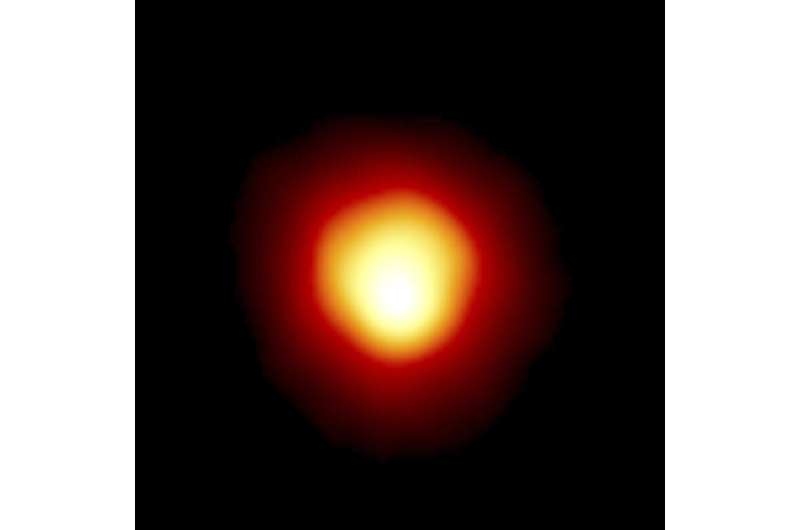This article has been reviewed according to Science X's editorial process and policies. Editors have highlighted the following attributes while ensuring the content's credibility:
fact-checked
reputable news agency
proofread
Asteroid will pass in front of bright star Betelgeuse to produce a rare eclipse visible to millions

One of the biggest and brightest stars in the night sky will momentarily vanish as an asteroid passes in front of it to produce a one-of-a-kind eclipse.
The rare and fleeting spectacle, late Monday into early Tuesday, should be visible to millions of people along a narrow path stretching from central Asia's Tajikistan and Armenia, across Turkey, Greece, Italy and Spain, to Miami and the Florida Keys and finally, to parts of Mexico.
The star is Betelgeuse, a red supergiant in the constellation Orion. The asteroid is Leona, a slowly rotating, oblong space rock in the main asteroid belt between Mars and Jupiter.
Astronomers hope to learn more about Betelgeuse and Leona through the eclipse, which is expected to last no more than 15 seconds. By observing an eclipse of a much dimmer star by Leona in September, a Spanish-led team recently estimated the asteroid to be about 34 miles wide and 50 miles long (55 kilometers wide and 80 kilometers long).
There are lingering uncertainties over those predictions as well as the size of the star and its expansive atmosphere. It's unclear if the asteroid will obscure the entire star, producing a total eclipse. Rather, the result could be a "ring of fire" eclipse with a miniscule blazing border around the star. If it's a total eclipse, astronomers aren't sure how many seconds the star will disappear completely, perhaps up to 10 seconds.
"Which scenario we will see is uncertain, making the event even more intriguing," said astronomer Gianluca Masa, founder of the Virtual Telescope Project, which will provide a live webcast from Italy.
An estimated 700 light-years away, Betelgeuse is visible with the naked eye. Binoculars and small telescopes will enhance the view. A light-year is 5.8 trillion miles.
Betelgeuse is thousands of times brighter than our sun and some 700 times bigger. It's so huge that if it replaced our sun, it would stretch beyond Jupiter, according to NASA.
At just 10 million years old, Betelgeuse is considerably younger than the 4.6 billion-year-old sun. Scientists expect Betelgeuse to be short-lived, given its mass and the speed at which it's burning through its material.
After countless centuries of varying brightness, Betelgeuse dimmed dramatically in 2019 when a huge bunch of surface material was ejected into space. The resulting dust cloud temporarily blocked the starlight, NASA said, and within a half year, Betelgeuse was as bright as before.
Scientists expect Betelgeuse to go supernova in a violent explosion within 100,000 years.
© 2023 The Associated Press. All rights reserved. This material may not be published, broadcast, rewritten or redistributed without permission.





















